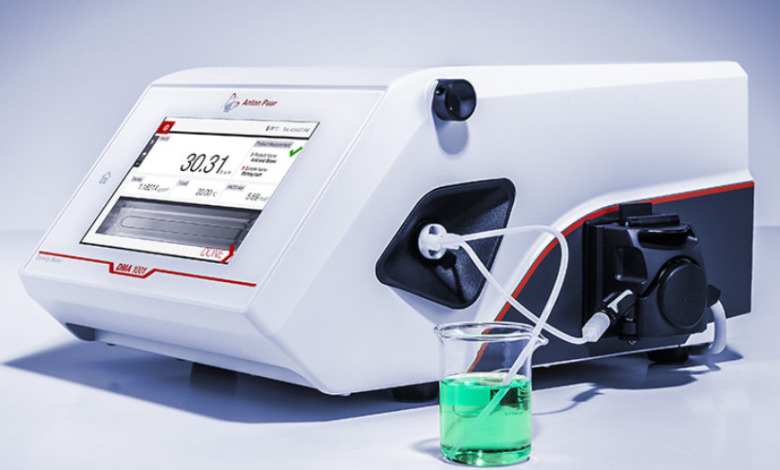Exploring Digital Density Meters

Introduction to Digital Density Meters
Digital density meters have revolutionized the way industries and laboratories measure the density of liquids with accuracy and precision. These instruments are essential in fields such as chemical manufacturing, food and beverage quality control, pharmaceutical research, and environmental testing. By providing rapid and reliable density measurements, digital density meters improve efficiency and help maintain strict quality standards.
How Digital Density Meters Work
Digital density meters operate primarily using vibrating tube or oscillating U-tube technology. In these devices, a sample of liquid is placed inside a precision tube. The tube is then set into oscillation, and the instrument measures changes in frequency caused by the mass of the liquid. These changes are processed electronically to calculate the liquid’s density.
Many modern digital density meters include features such as automatic temperature compensation and digital displays that simplify the measurement process. These functions ensure consistent results even when laboratory or production conditions vary.
See also: Enhancing Machine Reliability Through Advanced Oil Maintenance
Applications Across Industries
Digital density meters find applications in a wide range of industries:
- Chemical Industry: Ensuring correct concentration and consistency of solutions during production.
- Pharmaceuticals: Verifying the density of medicinal liquids for accurate formulation.
- Food and Beverage: Determining sugar concentration in beverages, alcohol content, and quality control of liquid products.
- Environmental Monitoring: Assessing water quality and detecting pollutants in liquid samples.
Using digital density meters in these applications allows for high accuracy, reproducibility, and faster processing compared to traditional manual methods.
Key Features to Look For
When choosing digital density meters, several features are crucial:
- High Accuracy: Reliable instruments provide precise readings with minimal deviation.
- Automatic Temperature Compensation: Maintains measurement accuracy despite fluctuations in laboratory conditions.
- User-Friendly Interface: Digital displays and intuitive menus facilitate easy operation.
- Data Connectivity: USB ports or software integration for recording and analyzing data.
- Calibration Options: Built-in calibration routines simplify maintenance and enhance long-term reliability.
Selecting instruments with these features ensures consistent results and reduces the risk of errors in measurements.
Advantages of Digital Over Manual Methods
digital density meters multiple advantages over traditional hydrometers or pycnometers:
- Speed: Measurements are obtained almost instantly, improving workflow efficiency.
- Precision: Digital meters offer higher accuracy and repeatability compared to manual methods.
- Automation: Reduced manual intervention minimizes human errors.
- Data Logging: Many devices allow for digital recording and analysis, facilitating compliance with laboratory documentation requirements.
These benefits make digital density meters indispensable in modern laboratories and production environments.
Maintenance and Calibration
Maintaining digital density meters is essential for consistent performance. Routine tasks include cleaning the measurement tube, ensuring proper storage, and performing periodic calibrations using standard reference liquids.
Some advanced models offer automated calibration features that simplify maintenance and reduce the risk of errors. Regular checks also ensure the longevity of the instrument and maintain accuracy over prolonged usage.
Technological Innovations
Recent developments in digital density meter technology have made these instruments more versatile and reliable. Innovations include higher resolution measurements, faster analysis times, integrated software for data management, and multifunction devices capable of measuring density, specific gravity, and concentration in a single unit.
These advancements enhance productivity, reduce the need for multiple instruments, and streamline laboratory and industrial processes.
Selecting the Right Supplier
Choosing a reliable supplier for digital density meters is critical. Considerations include:
- Quality Assurance: Instruments should meet international standards and certifications.
- Technical Support: Suppliers should offer training, installation guidance, and maintenance services.
- Product Range: Access to a variety of models suitable for different applications.
- Reliability: Suppliers with a proven track record ensure timely delivery and product consistency.
A dependable supplier ensures instruments are precise, durable, and supported with after-sales services, minimizing operational disruptions.
Cost Efficiency
While digital density meters involve an initial investment, they often reduce costs in the long term due to their accuracy, reliability, and low maintenance needs. Purchasing multiple units from trusted suppliers may also provide cost benefits, especially for laboratories or industrial facilities requiring several instruments.
Additionally, the reduction in human error and faster processing times offered by digital density meters increases operational efficiency, further justifying the investment.
Enhancing Laboratory and Industrial Operations
Integrating digital density meters into laboratory and industrial workflows allows for faster and more reliable measurements. Automation reduces manual work, minimizes errors, and provides consistent results, enabling researchers and technicians to focus on core analytical and production tasks.
The combination of precision, speed, and ease of use enhances overall efficiency while maintaining strict quality standards in both laboratory and industrial environments.
Conclusion
Digital density meters have become essential tools for industries and laboratories requiring precise liquid density measurements. They offer accuracy, speed, and reliability while streamlining operations. Choosing high-quality instruments and working with a trusted supplier ensures consistent performance and long-term efficiency.
By integrating digital density meters into workflows, laboratories and industries can improve productivity, reduce errors, and maintain high-quality standards, making these instruments an indispensable part of modern analytical and industrial practices.




